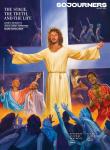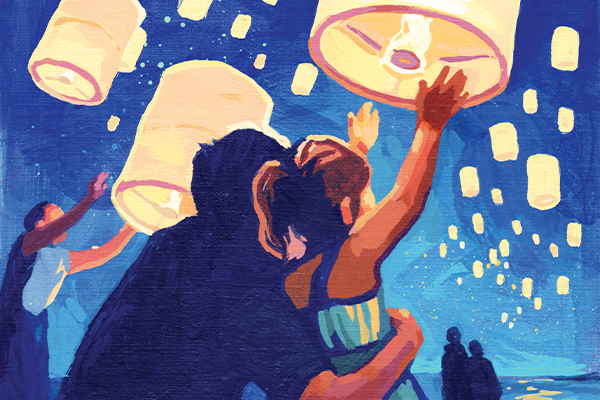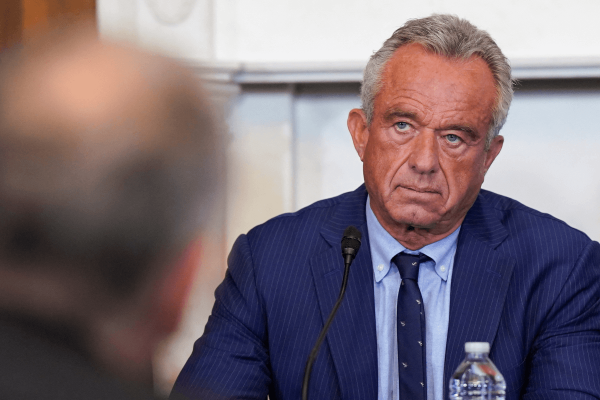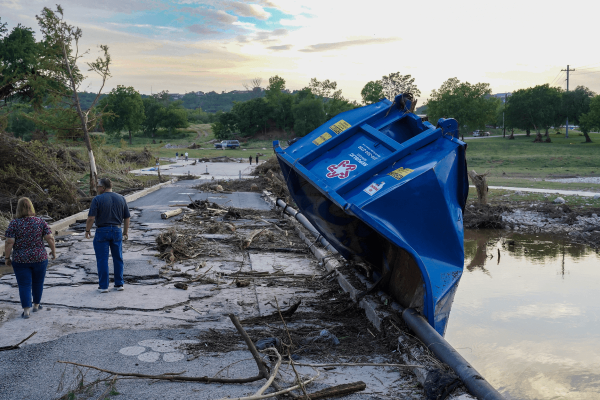FOR MANY OF us, 2025 feels like George Orwell’s 1984. Some Christians profess their faith in God while cutting off support systems for people who are weak and poor. They kneel down and pray for their policies to pass — policies that will hurt the marginalized. I want God’s mighty hands to swoop down and protect us from this dystopian reality. I catch myself hoping for an extreme divine intervention. Desperation can make us long for a quick solution.
Thankfully, the passages for this month guide us to the realization that there is another way. There are “clouds of witnesses” who have shown us how to traverse the fires and divisions in our lives. Trusting in God is also learning from people (and even towns) who have shown us what it means to love God and love our neighbors near and far. I lift up the names of Ruby Bridges, my friend John, the city of Skokie, Ill., and other witnesses who have shown me how to trust in God in ways that are liberating and healing.
Who are in your clouds of witnesses? Who has shown you what it means to love God and your neighbors? Today and for this month, I hope that you will invoke their names as we journey together in this dystopian time.
August 3
1984 and 2025
Hosea 11:1-11; Psalm 107:1-9, 43; Colossians 3:1-11; Luke 12:13-21
I FIRST ENCOUNTERED George Orwell’s 1984 when I came to the U.S. for graduate studies. I grew up in the Philippines; I don’t need a British person to tell me about dystopia, authoritarianism, and repressive regimes. But I bring it up because I find 1984 resonating with the current political climate in the U.S. I am particularly troubled by Christians who demand that others “seek the things that are above” (Colossians 3:1) and yet do not seem to mind a repressive regime that revels in evil desires, greed, malice, slander, and other “earthly” things. The hypocrisy is perplexing; the arguments made to attempt to justify hatred are baffling.
Some argue that U.S. voters chose this dystopian reality because of economic reasons. I recognize that some U.S. citizens are in difficult financial situations. Nevertheless, if they confess to be followers of the gospel, then I hope they will reflect on Luke 12:15’s message: “Be on your guard against all kinds of greed, for one’s life does not consist in the abundance of possessions.” In other words, greed can become an idol, a driving force that replaces Christ’s love in our lives.
The kin-dom of God cannot be taken over by those who perform the Nazi salute, who seek to take from the weak, the poor, and the oppressed to fill the coffers of the ultrarich. 2025 cannot be Orwell’s sequel.
August 10
Performative Religiosity
Isaiah 1:1, 10-20; Psalm 50:1-8, 22-23; Hebrews 11:1-3, 8-16; Luke 12:32-40
Among the many Christianity-based cults that originated in Korea, one recruits new members by asking the exact date, time, and location of one’s conversion. If you cannot remember, then to them your conversion did not happen, so you had better join them to be saved. “Ironic” does not fully capture this group’s brainwashing technique since its “faith alone” discourse, supposedly based on Hebrews 11:1-3 (“by faith our ancestors received approval”), is ladened with absurdly legalistic religiosity no other group would demand.
Isaiah 1:10-20 and Psalm 50 speak of vain religiosity — and worse, religiosity that oppresses others. God admonishes the people and rulers of Sodom and Gomorrah (Isaiah 1:10) to make themselves clean by learning to do good, seeking justice, rescuing the oppressed, defending the orphan, and pleading for the widow (Isaiah 1:16-17). Isaiah 1 is an admonishment to all Christians who prefer to perform religiosity rather than caring for the marginalized, who seek self-aggrandizement instead of living out faith-based discipleship by loving one another.
In other words, the passages for this week invite us to truly trust in God to the point that we can sell our possessions and give alms (Luke 12:33). Don’t worry. As radical as that might sound, God is in control, right?
August 17
Fire and Division
Isaiah 5:1-7; Psalm 80:1-2, 8-19; Hebrews 11:29 - 12:2; Luke 12:49-56
Did Jesus actually declare that he came to “cast fire upon the earth,” to bring division not peace (Luke 12:49-56)? How do these statements reconcile with Jesus’ other declaration: “Peace be with you” (Luke 24:36)? These apparently contradictory statements are hard to reconcile. We need to create some room for mystery on this issue because we are not privy to the transcripts or his inner thoughts, and there’s the possibility that the Luke 12 passage might be less prescriptive and more descriptive. That is, the author of Luke might be placing into the mouth of Jesus what is happening in their time. Jesus did not have to bring fire and division — they already exist. We all experience fire (literal and metaphorical) and division in our lives almost every day. Luke could be expressing his dismay, a sigh of exhaustion, on how our world is already burning and yet we fight each other as if there were no tomorrow.
Where do we go from here? Paul reminds us in Hebrews 12:1 that there is a cloud of witnesses who have traversed the fires and divisions of our time. Today, I remember Ruby Bridges. She is an African American activist who was one of the first to desegregate an elementary school in the South. Her witness teaches us the resilience and courage needed to face the fires and divisions of our lives.
August 24
No Excuses
Jeremiah 1:4-10; Psalm 71:1-6; Hebrews 12:18-29; Luke 13:10-17
One of my biggest regrets in life concerns my friend John. A serious car accident left him paralyzed. I became distant. Our friendship was never the same. To this day, I am remorseful that I was not there for him enough. It has been more than a decade since we talked. My regret does not compare to the challenges and changes that he has had to face. There are some situations in which I find myself asking that God provide a miraculous healing — if possible, right now.
“Right now” might seem presumptuous or even shortsighted, but in the face of suffering — like the woman bent over for 18 years (Luke 13:10-17) — healing cannot come soon enough. I do not delay caring for my children when they are sick or feeding them when they’re hungry. In the same way, I demand God’s intervention to stop suffering.
God does not cause car accidents or birth defects or the onset of disease. No matter who we are or what we face, God knows us intimately (see Jeremiah 1:5). My mistake was separating myself from my friend when he needed me, a mistake I will do my best not to repeat. No excuses. As I work alongside people with disabilities fighting for inclusion and equitable treatment in our society, I remember my friend. And I pray.
August 31
City of Refuge
Jeremiah 2:4-13; Psalm 81:1, 10-16; Hebrews 13:1-8, 15-16; Luke 14:1, 7-14
I live in Skokie, a suburb of Chicago. It is famous for having the second highest population of Holocaust survivors in the U.S. My neighbors in Skokie include Jews, Hindus, Muslims, Assyrian Christians, and others.
Recently, my children’s elementary school had an event to celebrate cultures. Students were encouraged to talk about a member of their family who migrated to the U.S. Parents and friends were invited to participate in this day of celebration. The families of more than half of the student body came from war-torn nations. As I listened to the students’ stories, I had tears in my eyes, realizing that my town has never stopped being a refuge for those who need safety and rest.
The liberating spirit of my town resonates with Hebrews 13:1-3. I am proud that we show hospitality to strangers near and far. My town has welcomed to the table those who are poor, crippled, lame, and blind (Luke 14:13). My town isn’t perfect, yet I feel it has heeded the voice of God (“Open wide your mouth and I will fill it,” Psalm 81:10). I pray that our town — and the rest of us — will continue to live out the mission of caring for the oppressed and marginalized.

Got something to say about what you're reading? We value your feedback!






